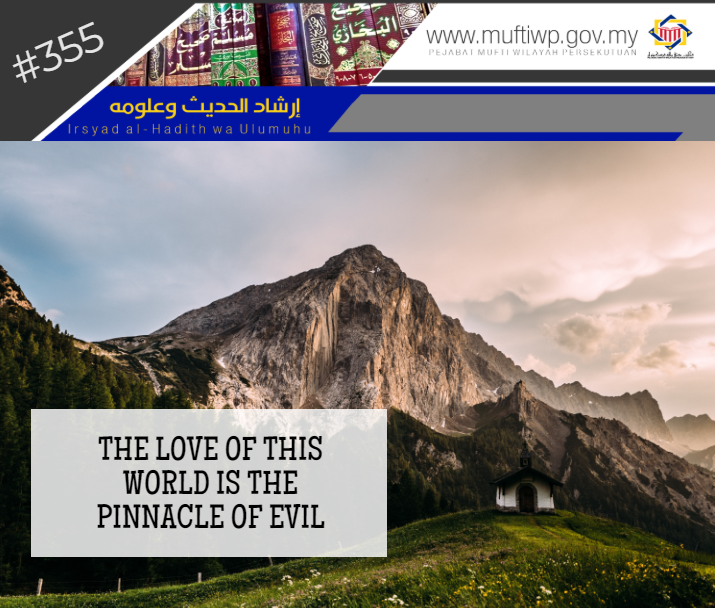Question:
What is the status of this hadith?
حُبُّ الدُّنْيَا رَأْسُ كُلِّ خَطِيئَةٍ
“Love towards this world is the height of evil.”
Answer:
Alhamdulillah, praise and thanks to Allah for the countless blessings He has blessed us all with. Blessings and salutations to the Prophet Muhammad PBUH, his wives, his family, companions and all those that follow his teachings to the day of judgement.
In the Quran, it is stated that this world is but a stopover for humans and it is a place of securing provisions to be brought to the everlasting place in the hereafter. This is in accordance with the statement of Allah SWT:
مَن كَانَ يُرِيدُ حَرْثَ الْآخِرَةِ نَزِدْ لَهُ فِي حَرْثِهِ ۖ وَمَن كَانَ يُرِيدُ حَرْثَ الدُّنْيَا نُؤْتِهِ مِنْهَا وَمَا لَهُ فِي الْآخِرَةِ مِن نَّصِيبٍ
“Whoever desires the harvest of the Hereafter - We increase for him in his harvest. And whoever desires the harvest of this world - We give him thereof, but there is not for him in the Hereafter any share.”
Surah al-Syura (20)
Whoever intends to do good deeds to get the rewards in the hereafter, then We will strengthen him and increase his wealth and rewards him immensely. And whoever wishes for this world and its wealth and neglects the hereafter, then We will only give him what has been predetermined for him (without any addition) and there will be none for him in the hereafter. A true believer and those who protect their faith will do good for this world and the hereafter (not just solely for this world). (See Tafsir al-Wasith, 2335/3)
According to the above question, there is another narration that is similar to the above narration as cited by Imam al-Baihaqi but it is referred to be from the Prophet Jesus AS:
كَانَ عِيسَى عَلَيْهِ السَّلَامُ يَقُولُ: حُبُّ الدُّنْيَا أَصْلُ كُلِّ خَطِيئَةٍ
“Whereas the Prophet Moses AS said: Love of this world is the source (origin) of all evil.” (See Syu’ab al-Iman, 74/13)
Furthermore, this narration is also referred to Malik bin Dinar as cited by Imam Ibn Abi al-Dunia and it is also said to be the words from Jundub al-Bajaliy who is one of the companions of the Prophet PBUH. (See al-Asrar al-Marfu’ah, 179-180/1). Thus, here we present the opinions of the scholars regarding this hadith:
- Imam al-Baihaqi (458 H) evaluate the hadith as mursal for he referred it to al-Hasan al-Basri directly to the Prophet PBUH without going through the Companions. (See Syu’ab al-Iman, 102/13)
- Imam al-Saghani (650 H) states the hadith is fake. (See al-Mawdhu’at, 37/1)
- Imam al-Zarkasyi (792 H) said the hadith is not from the Prophet PBUH and it is but the statement of al-Hasan al-Basri. (See al-La’aliy al-Manthurah, 122/1)
- Imam al-Iraqi (806 H) evaluate the hadith as mursal from the statement of al-Hasan al-Basri. (See al-Mughni ‘an Haml al-Asfar, 1102/1)
- Syeikh Mulla Ali al-Qari (1014 H) evaluate the hadith as fake. (See al-Asrar al-Marfu’ah, 180/1)
After considering the above opinions, we can conclude the narration is not from the Prophet PBUH but a statement from al-Hasan al-Basri and the status of the hadith is mursal. As for the ruling of mursal for this hadith, we have written about it in Irsyad al-Hadith series 147.
Conclusion
To conclude, the hadith is mursal and the sanad is not connected to the Prophet PBUH. Lastly, may Allah SWT give us understanding in this religion and protect our tongues from any deception in the name of the Prophet PBUH. Amin.
Wallahua’lam.


